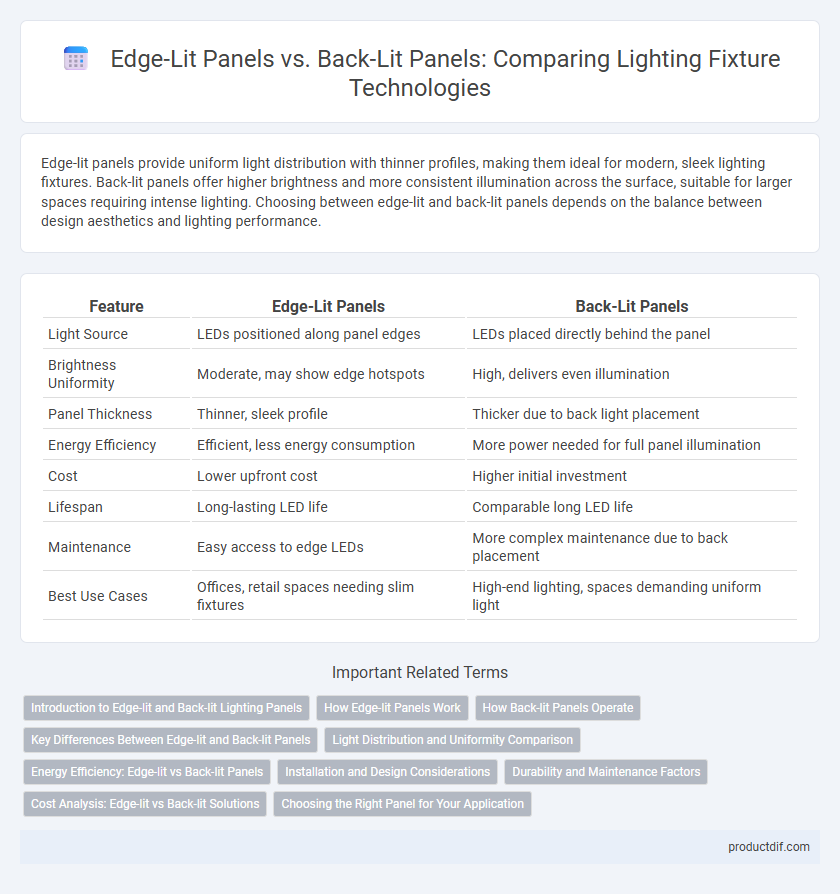Edge-lit panels provide uniform light distribution with thinner profiles, making them ideal for modern, sleek lighting fixtures. Back-lit panels offer higher brightness and more consistent illumination across the surface, suitable for larger spaces requiring intense lighting. Choosing between edge-lit and back-lit panels depends on the balance between design aesthetics and lighting performance.
Table of Comparison
| Feature | Edge-Lit Panels | Back-Lit Panels |
|---|---|---|
| Light Source | LEDs positioned along panel edges | LEDs placed directly behind the panel |
| Brightness Uniformity | Moderate, may show edge hotspots | High, delivers even illumination |
| Panel Thickness | Thinner, sleek profile | Thicker due to back light placement |
| Energy Efficiency | Efficient, less energy consumption | More power needed for full panel illumination |
| Cost | Lower upfront cost | Higher initial investment |
| Lifespan | Long-lasting LED life | Comparable long LED life |
| Maintenance | Easy access to edge LEDs | More complex maintenance due to back placement |
| Best Use Cases | Offices, retail spaces needing slim fixtures | High-end lighting, spaces demanding uniform light |
Introduction to Edge-lit and Back-lit Lighting Panels
Edge-lit lighting panels use LEDs positioned along the edges, directing light through a thin panel to create uniform illumination with energy efficiency and a slim profile. Back-lit panels feature LEDs distributed behind a diffuser, producing consistent and bright light suitable for high-lumen applications and larger fixtures. Both panel types offer distinct advantages in design flexibility, brightness distribution, and installation, catering to various commercial and residential lighting needs.
How Edge-lit Panels Work
Edge-lit panels utilize LEDs positioned along the perimeter of the fixture, directing light through a thin, transparent panel embedded with microstructures that evenly distribute brightness across the surface. This advanced light guide technology ensures uniform illumination with minimal glare and a slimmer profile compared to traditional back-lit panels. Edge-lit lighting panels are ideal for applications requiring sleek designs and energy-efficient performance in offices, retail spaces, and modern interiors.
How Back-lit Panels Operate
Back-lit panels operate by placing LED light sources directly behind the diffuser panel, allowing light to pass through a translucent surface for uniform illumination. This setup enhances brightness and color consistency by evenly distributing light across the panel's surface. The direct placement of LEDs in back-lit panels typically results in higher lumens per watt compared to edge-lit panels.
Key Differences Between Edge-lit and Back-lit Panels
Edge-lit panels distribute light through LEDs positioned along the edges, resulting in thinner fixtures and energy-efficient performance, while back-lit panels feature LEDs directly behind the diffuser, offering higher brightness and more uniform illumination. Edge-lit designs are typically slimmer, making them ideal for modern architectural applications, whereas back-lit panels provide greater color accuracy and intensity suitable for commercial environments. The choice between edge-lit and back-lit panels depends on factors like desired light quality, fixture thickness, energy consumption, and installation setting.
Light Distribution and Uniformity Comparison
Edge-lit panels utilize LEDs positioned along the panel edges, delivering thinner designs and more energy-efficient light diffusion, but they may exhibit slight variations in brightness near the edges. Back-lit panels feature LEDs evenly spread behind the panel surface, producing superior light uniformity and consistent brightness across the entire panel, ideal for environments demanding high-quality lighting. In terms of light distribution, back-lit panels outperform edge-lit options by minimizing hotspots and shadows, ensuring more balanced illumination for commercial and residential applications.
Energy Efficiency: Edge-lit vs Back-lit Panels
Edge-lit panels consume significantly less energy than back-lit panels due to the placement of LEDs along the panel edges, optimizing light distribution with fewer diodes. Back-lit panels require more LEDs directly behind the panel, leading to higher energy usage and heat generation. This energy efficiency difference makes edge-lit panels a preferred choice for sustainable and cost-effective lighting solutions.
Installation and Design Considerations
Edge-lit panels offer a slim, lightweight profile ideal for recessed or surface-mounted installations where minimal depth is a priority, making them suitable for modern, sleek ceiling designs. Back-lit panels provide uniform illumination with greater diffuser thickness, requiring more installation space but offering superior light distribution, beneficial for large commercial environments prioritizing brightness. Consideration of ceiling cavity depth, ease of access for maintenance, and desired aesthetic impact are crucial when selecting between edge-lit and back-lit panel designs.
Durability and Maintenance Factors
Edge-lit panels feature LEDs positioned along the panel edges, resulting in a slimmer profile and often enhanced durability due to fewer internal components exposed to heat and dust. Back-lit panels house LEDs directly behind the panel, which can lead to increased heat accumulation and potential wear, potentially requiring more frequent maintenance. Maintenance for edge-lit panels is typically simpler and less costly, as the LEDs are more accessible and the design reduces complications related to heat dissipation over time.
Cost Analysis: Edge-lit vs Back-lit Solutions
Edge-lit panels typically offer a lower upfront cost compared to back-lit panels due to simpler LED placement and reduced material usage, making them a budget-friendly option for large-scale projects. Back-lit panels, while more expensive initially, provide superior light uniformity and longer lifespan, potentially reducing maintenance and replacement costs over time. Evaluating the total cost of ownership, including energy efficiency and durability, is essential for accurate cost analysis between edge-lit and back-lit lighting solutions.
Choosing the Right Panel for Your Application
Edge-lit panels provide uniform illumination with a slim profile, making them ideal for modern office spaces and retail displays where aesthetics and energy efficiency are priorities. Back-lit panels offer higher brightness and better light diffusion, suited for environments requiring intense, even lighting such as hospitals and industrial settings. Selecting the right panel depends on factors like installation space, desired light output, and energy consumption requirements.
Edge-lit Panels vs Back-lit Panels Infographic

 productdif.com
productdif.com